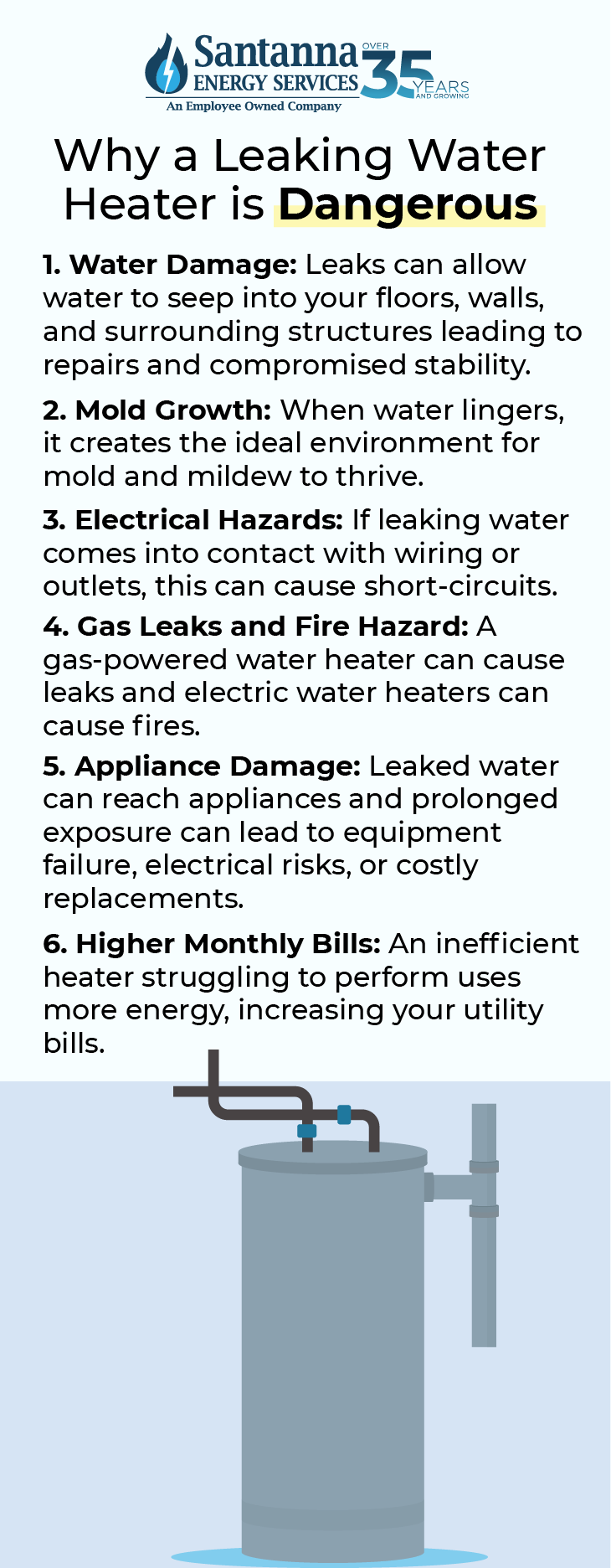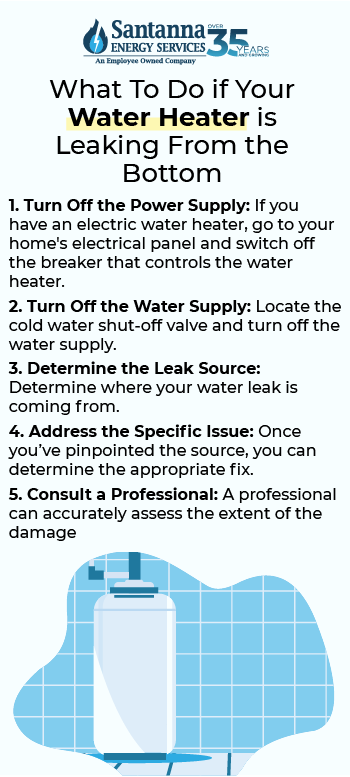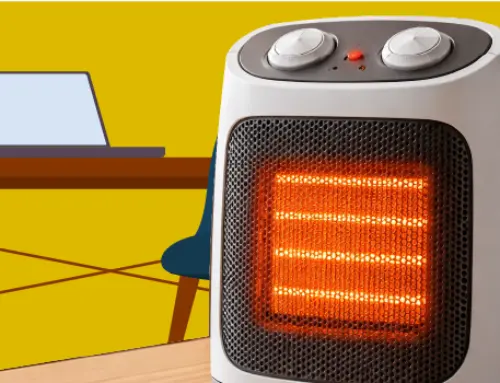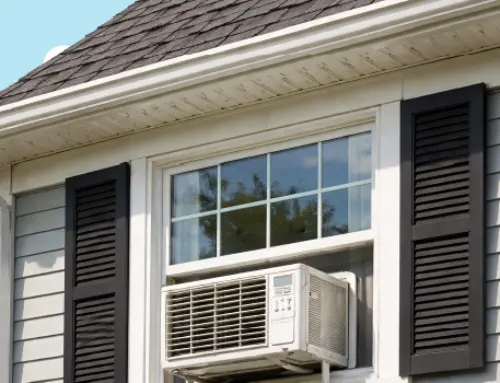Is a Leaking Water Heater Dangerous?
by Tyler Castle
20.5 min read
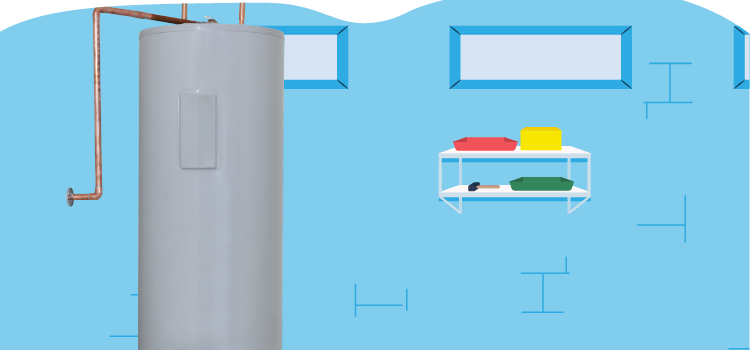
Imagine coming home after a long day, ready to unwind—only to discover a small pool of water forming beneath your water heater. You pause, confused. Is it leaking? Is that normal? Do you need to do something about it right now?
It's easy to dismiss a small leak as no big deal, especially if your hot water still seems to be working fine. But here's the thing: a leaking water heater can turn dangerous quickly. What might look like a minor drip could actually be a warning sign of a much bigger problem.
So, before you grab a mop and move on, let's hit pause. We'll walk you through everything you need to know about leaking water heaters, why they leak, how to identify the signs, and what steps to take if you spot one in your home. Because when it comes to a leaking water heater, dangerous outcomes are preventable, but only if you act early.
Let's get started so you can avoid a costly (potentially dangerous) mess.
Key Points of This Article:
- Water heater leaks commonly stem from corrosion, sediment buildup, loose connections, faulty valves, or excessive water pressure.
- Warning signs include pooling water, unusual noises, weak hot‑water pressure, rust‑colored water, rising energy bills, and strange odors.
- Leaks pose serious risks such as structural water damage, mold growth, electrical hazards, gas leaks, and in rare cases are explosions.
- Immediate steps include shutting off power and water, draining the tank if needed, and contacting a licensed plumber for inspection or replacement.
What Causes a Water Heater to Leak?
When it comes to home maintenance, knowing what causes a water heater to leak can save you from unexpected headaches and costly repairs. Here are some common culprits behind a leaking and potentially dangerous water heater:
1. Corrosion (The Slow Breakdown of the Tank)
Over time, especially in older units, the protective inner lining of the tank can wear down, allowing water to come into direct contact with the metal. This exposure causes rust to develop, which gradually weakens the tank and can lead to small cracks and steady leaks.
Tip: Replacement is usually the best option if your unit is over 8–12 years old and shows signs of rust or leaking from the tank itself.
2. Sediment Buildup (The Silent Troublemaker)
If you live in an area with hard water, minerals can settle at the bottom of the tank. This creates a layer of sediment that traps heat, causes overheating, and eventually weakens the tank. That heat stress is a major factor in what causes a water heater to leak, especially from the bottom.
Tip: Flushing your tank once a year can help reduce sediment and extend the life of your heater.
3. Loose Connections (Simple but Sneaky)
The pipes that carry water in and out of the heater can loosen over time due to regular use or poor installation. Frequent temperature changes or even vibrations during operation can also cause these pipes to loosen. This kind of leak can be easy to miss but may cause water damage if left unchecked.
Tip: These can often be tightened with a wrench, but a plumber should inspect for signs of wear or corrosion around the fittings.
4. Faulty Valves (Tiny Parts, Big Problems)
Water heaters have a few critical valves like the drain valve and the temperature and pressure relief (T&P) valve. If these are worn out or installed incorrectly, they can start to leak around the base or fittings. A dripping valve might look minor, but it's often a symptom of a bigger issue.
Tip: If water is leaking from the base or side of a valve, it may need to be replaced, not repaired.
5. High Water Pressure or Thermal Expansion
Another cause of a leaking water heater is high water pressure. If your home's water pressure is too high or your system lacks an expansion tank, the excess pressure can put stress on the water heater. Over time, this strain can force water out through weak points like joints, valves, or even the tank itself.
Tip: A plumber can install a pressure-reducing valve or an expansion tank to help manage this.
Signs Your Water Heater is Leaking
Not all leaks are obvious at first, but your water heater will often give you warning signs before things get worse. If you notice any of the following signs, your water heater could be leaking or on its way out:
1. The Unit Is Leaking or Has Water Pooling Around It
If you see water pooling near the base of your water heater, that's a clear sign your water heater is leaking. It could be coming from valves, loose fittings, or the tank itself. Leaks, even small ones, can cause serious damage and should never be ignored.
2. Unusual Sounds
Popping, banging, or rumbling noises likely means sediment has built up at the bottom of the tank. This layer traps heat, causing the metal to overheat—and over time, it can crack and start leaking.
3. Weak Hot Water Pressure
If your hot water pressure feels weak while your cold water flows just fine, sediment may be clogging your tank or pipes. That buildup can block water flow and increase the chances of damage or leaks.
4. Rust-Tinted or Discolored Water
When rust-colored or murky water comes out of your hot tap, it's often due to corrosion inside the tank. Once the anode rod wears out, the metal tank starts to rust, which is another silent but serious sign that your water heater is leaking.
5. Hot Water Running Out Too Fast
If your showers are quickly losing hot water, the tank may be losing efficiency. Internal damage, like sediment buildup, corrosion, or a failing heating element, can make it harder for the unit to maintain the right temperature, leading to shorter periods of hot water availability.
6. Spiking Energy Bills
A water heater that's leaking or compromised internally has to work overtime to maintain the set water temperature. This constant running cycle demands more electricity or gas, driving up your monthly costs. If you've ruled out other causes, a sudden rise in your energy bill could be a subtle but important indicator that your water heater has issues or has begun leaking.
7. Weird Smells from Your Water
Hot water that smells like rotten eggs or has a musty odor is often a sign of bacteria growing in the tank. The presence of sulfate-reducing bacteria reacting with the tank's anode rod can create a sulfur-like smell. Mold or mildew forming near a hidden leak can also taint your water supply, posing a potential health risk. Any strange odors from your hot water warrant a closer inspection of your system.
Types of Water Heater Leaks
Water heater leaks can occur in a few different places, and knowing where the water is coming from can help you figure out what's wrong and what to do next. Here's a breakdown of the most common types of leaks and what might be causing them:
1. Leaks From the Top of the Water Heater
If you notice water dripping down from the top of your water heater or pooling around the upper portion, you're likely dealing with a leak from the top. These are usually easier to catch early and often stem from loose pipe connections, a faulty temperature and pressure (T&P) relief valve, or corrosion around the inlet and outlet fittings.
You might also spot moisture or rust on the top edges of the tank or see water running down the sides. This type of leak can sometimes be fixed by tightening connections or replacing the valve, but it's important to act quickly to avoid further damage.
2. Leaks From the Bottom of the Water Heater
A puddle forming beneath your water heater is one of the most common signs of a leak from the bottom of your water heater. This could be caused by a worn-out drain valve, internal tank corrosion, or sediment buildup causing the base to overheat and weaken.
If the leak is coming from the drain valve, you might see water dripping from the spout or connections. However, if the tank itself is rusting through at the bottom, you may not see the exact source, but you'll notice the steady formation of water underneath. These leaks often indicate more serious internal damage and may mean it's time to replace the unit entirely.
3. Leaks From the Tank Itself
When the actual body of the water heater tank begins leaking, it's usually a sign of long-term corrosion or a structural failure inside the tank. This type of leak typically starts slow and worsens over time, and it's often the result of the anode rod inside the heater failing to prevent rust buildup.
You may spot rust stains, water trickling down the sides, or moisture seeping from seams or welds in the tank. Unfortunately, most of the time, a leaking tank itself can't be repaired, so replacing the entire water heater is your safest and most cost-effective option.
Is a Leaking Water Heater Dangerous?
Yes, a leaking water heater is absolutely dangerous, even if the leak seems small at first glance. The level of danger depends on where the leak is coming from and what's causing it, because what starts as a tiny drip can quickly spiral into something that puts your home and your safety at risk.
Potential Dangers of a Leaking Water Heater
A leaking water heater is more than a minor inconvenience; it poses several significant risks to your home and health. Here's a closer look at the potential dangers:
- Water Damage: Leaks can allow water to seep into your floors, walls, and surrounding structures. Over time, this constant moisture can weaken important structural components of your home, leading to costly repairs and even compromising your home's stability. Weakened floors can lead to family members and pets getting injured if not taken care of right when the leak starts.
- Mold Growth: When water lingers, it creates the ideal environment for mold and mildew to thrive. Mold isn't just a cosmetic issue; it can trigger allergies, worsen asthma, and affect indoor air quality, leading to long-term health effects while also damaging building materials.
- Electrical Hazards: Water and electricity don't mix. Water leaking onto electrical components—such as wiring, outlets, or parts inside a water heater—can lead to short circuits, electric shocks, or potentially even ignite a fire.
- Gas Leak and Fire Hazard: In gas-powered water heaters, a leak can indicate a gas leak, which is a serious fire hazard. If there's a break or loose connection in the gas line, natural gas can escape into the surrounding area. Since natural gas is highly flammable, even a small leak can lead to dangerous situations, including explosions. If you notice a sulfur or "rotten egg" smell near your water heater, it could signify a gas leak. In such cases, it's imperative to evacuate the area and contact emergency services immediately.
- Appliance Damage: Water leaking from your heater doesn't always stay in one place—it can reach nearby appliances like your washing machine, dryer, or HVAC system. Prolonged exposure can lead to equipment failure, electrical risks, or costly replacements.
- Higher Monthly Bills: An inefficient heater that is struggling to perform uses more energy, which will lead to increased utility bills. A leaking water heater isn't just bad for your home; it can also impact the environment by releasing methane, a greenhouse gas far more potent than carbon dioxide.
Will a Leaking Water Heater Explode?
While rare, a leaking water heater can lead to an explosion under certain conditions. The temperature and pressure relief (T&P) valve serves as the main safety feature and allows excess pressure to escape from the tank when necessary. If this valve malfunctions or if pressure builds up due to overheating or other issues, the tank's integrity can be compromised, potentially resulting in an explosion. Regular maintenance and prompt attention to leaks are crucial to prevent such hazardous situations.
Keep in mind that gas water heaters can be prone to gas leaks. A leak from your hot water tank near the flame or pilot light can cause a fire or explosion. If you smell gas, act fast, turn off the supply and call a professional immediately.
Similarly, a poorly installed unit might not drain, vent, or release pressure properly which leads to safety issues. Always hire a licensed professional to install your water heater to ensure it meets safety standards.
What To Do When Your Water Heater Leaks
Discovering your water heater is leaking can be concerning, but taking immediate action can mitigate damage and ensure safety. Here's a step-by-step guide on what to do when your water heater leaks:
1. Turn Off Power
One of the first and most important steps when your water heater leaks is to turn off the power supply. This is crucial not just to stop the leak from getting worse, but also to prevent potential safety hazards.
If you have an electric water heater, start by locating your home's electrical panel and finding the breaker labeled for the water heater. Once found, flip that breaker to the "off" position—this cuts off electricity to the unit and reduces the risk of electrical shock or further damage.
For gas water heaters, the process is a little different. Look near the bottom of the unit for the gas control valve. Turn the on/off dial to the "off" position to shut off the gas supply. This step helps prevent gas leaks and eliminates the risk of fire or explosion. Keep in mind that the location to shut off your water heater will vary from model to model.
2. Turn Off the Water Supply
Step two in handling a leak is to turn off the water supply to stop more water from entering the tank. Even when your electricity or gas is powered off, water can still sit within your tank and won't stop your tank from leaking unless you drain your tank or turn off your water supply. Start by locating the cold water shut-off valve, which is typically positioned just above the water heater on the cold water line.
If it's a traditional knob-style valve, turn it clockwise until it won't turn anymore. If it's a lever-style valve, rotate or pull it so that it sits perpendicular to the pipe, as this indicates the water is off. If the valve is hard to reach, damaged, or doesn't work properly, your next best option is to shut off the main water supply to your home.
Cutting off the water flow helps minimize further leaking, flooding, and potential damage to your space.
3. Drain the Water Heater (If Necessary)
When a water heater leaks, you may need to drain the water heater especially if there's a significant amount of water inside the tank or you need to inspect it more closely.
To start, connect a garden hose to the drain valve at the bottom of the unit. Then, place the other end of the hose in a safe drainage area, such as a floor drain, a sump pit, or outdoors. Just be sure it's lower than the tank so gravity can assist with the flow. Once everything is set, carefully open the valve to let the water drain out. Keep in mind, the water might still be hot, so proceed with caution.
If you have a tankless water heater, you don't have to drain your system since tankless water heaters only supply water on demand rather than hold a reserve like traditional water heaters.
4. Call a Professional Plumber
After securing the area and minimizing immediate risks, contact a licensed plumber to inspect and repair or replace your water heater. Attempting repairs without proper expertise can be dangerous and may lead to further damage.
What To Do if Your Water Heater is Leaking From the Bottom
If your water heater is leaking from the bottom, it's important to act quickly, as this type of leak can signal more serious internal problems. Bottom leaks should never be ignored, as they can quickly worsen and result in significant water damage or system failure.
Here's how you stop the water heater from leaking if it comes from the bottom:
1. Turn Off the Power Supply
If your water heater is leaking from the bottom, your first priority should be safety. Begin by turning off the power supply to the unit. For electric water heaters, go to your home's electrical panel and turn off the breaker that controls the water heater.
For a gas water heater, locate the on/off dial or switch on the unit, usually near the bottom, and turn it to the "off" position. This helps prevent electrical hazards or gas-related risks while you assess the situation.
2. Shut Off the Water Supply
Stop the water from flowing into the tank. Find the cold water shut-off valve, typically located directly above the unit on the water line. Turn it clockwise to cut off the water supply. Halting the water flow can help limit further leakage and reduce the risk of water damage while you inspect the issue.
3. Determine the Leak Source
Check the drain valve near the base of the tank; this is one of the most common reasons water heaters leak from the bottom. Also, inspect the bottom of the tank itself for visible corrosion or pooling water, which may suggest internal damage or rusted-through metal.
4. Address the Specific Issue
Once you've pinpointed the source, you can determine the appropriate fix. If the drain valve is leaking, it might just need to be tightened or replaced with a new one, which is an easy and inexpensive repair. However, if you find that the tank is corroded, it's a more serious issue which means the structural integrity of the unit has failed, and replacement is the only safe option. Unfortunately, internal tank damage can't be effectively repaired.
5. Consult a Professional Plumber
Because bottom leaks often point to deeper problems, one of the most important steps to do if water heater is leaking from bottom is to call a licensed plumber. A professional can evaluate the damage, confirm whether repairs are possible, or help you select and install a new unit if needed. Prompt action can prevent further damage and ensure your home stays safe and dry.
Tip: Regularly flushing your water heater to remove sediment buildup can prolong its lifespan and reduce the risk of corrosion-related leaks.
What To Do if Your Water Heater is Leaking From the Top
Leaks coming from the top of the water heater are often less severe and more manageable than those from the bottom. These types of leaks often stem from issues like loose or faulty inlet and outlet connections since the pipes that bring cold water into the heater and carry hot water out can loosen over time due to regular use or vibration. Here's how you can stop the water heater from leaking if it comes from the top:
1. Turn Off the Power Supply
The first thing to do if your water heater is leaking from the top is to shut off the power. For electric water heaters, locate your home's electrical panel, then turn off the breaker that controls the unit. If you have a gas water heater, find the on/off dial near the bottom of the heater and turn it to the "off" position to stop the gas supply. This step is essential for your safety before inspecting the leak.
2. Shut Off the Water Supply
Next, stop the water flowing into the tank. Identify the cold water shut-off valve, which is typically situated above the heater. Turn it clockwise until it stops completely. This helps prevent more water from leaking while you assess the problem.
3. Identify the Leak Source
To figure out what to do if your water heater is leaking from the top, you'll need to locate exactly where the water is escaping. After drying the top of the heater with a towel, watch closely to see where the water begins to emerge. Focus on the inlet and outlet connections, the temperature and pressure relief (T&P) valve, and the anode rod port, as these are common culprits.
4. Tighten or Replace Components
If any of the connections appear loose, use a wrench to gently tighten them, but just be careful not to overtighten, which could cause more harm. If you notice water leaking from the T&P valve or anode rod port, these parts may need to be replaced. Knowing which component is failing is key in deciding the next steps.
5. Consult a Professional Plumber
If you're unsure about handling these fixes yourself or if the leak continues despite your efforts, the best thing to do is to call a licensed plumber. A professional can confirm the source of the issue, ensure a safe repair, and help prevent future problems.
When To Call a Professional
Although homeowners can tackle basic maintenance themselves, certain situations are better left to a licensed plumber. Water pooling around the base or dripping from connections indicates a problem that requires immediate attention. If it's a quick fix, you can try handling it, but it's best to leave major leaks and issues for the professionals to troubleshoot.
Fluctuations in water temperature or a complete lack of hot water can signal issues with heating elements or thermostats. Professional plumbers often have specialized tools to test these issues, which leads to faster problem-solving.
Strange sounds, like popping or hissing, or unpleasant smells may indicate sediment buildup or bacterial growth within the tank. In these scenarios, contacting a licensed plumber ensures accurate diagnosis and appropriate repairs, preventing further damage and potential safety risks.
How Often Should I Have My Water Heater Inspected?
Regular inspections are vital to prolonging the lifespan of your water heater and ensuring its safe operation. You should have your water heater professionally inspected at least once a year. During these inspections, technicians can identify and correct minor issues before they become major problems, ensuring the system remains efficient and reducing the likelihood of unexpected failures.
How Much Does a New Water Heater Cost?
| Type of Water Heater | Unit Cost | Installation Cost | Total Replacement Cost |
|---|---|---|---|
| Traditional Tank | $600 – $2,500 | $150 – $800 | $750 – $3,300 |
| Tankless | $1,400 – $3,900 | Higher (especially with retrofits) | $1,800 – $4,500+ |
Data from Nerd Wallet
Keep in mind that these are average estimates, and actual costs can vary based on location, brand, and specific installation requirements. Consulting a professional plumber can provide a more accurate assessment tailored to your situation.
FAQ
Is it normal for the pressure relief valve to release water?
The T&P valve is designed to release water when pressure or temperature inside the tank exceeds safe limits. Occasional dripping can be normal, especially during heating cycles. However, continuous or excessive discharge indicates potential issues, such as high pressure or a faulty valve, and should be addressed promptly to prevent further complications.
Can I still use my water heater if it is leaking?
Continuing to use a leaking water heater is not advisable. Even minor leaks can escalate, leading to significant water damage, mold growth, or electrical hazards. It's essential to turn off the heater and consult a plumber to assess and fix the issue before resuming use.
Does homeowners insurance cover water heater leaks?
Often, homeowners insurance policies cover water damage caused by unexpected and accidental events, like a burst water heater. However, they typically do not cover damage from gradual wear and tear or lack of maintenance. For instance, if a water heater leaks because of age-related deterioration, the resulting damage might not be covered. It's essential to review your specific policy details and consult with your insurance provider to understand the extent of your coverage.
Maintaining a water heater involves regular inspections and prompt attention to leaks to ensure the safety and longevity of your home. By being proactive, homeowners can ensure their water heating systems operate efficiently, extend the appliance's lifespan, and avoid unexpected expenses. Always consult with professionals when in doubt, as their expertise can provide peace of mind and safeguard your home against potential water heater-related issues.
For reliable energy solutions that support your home's efficiency year-round, consider Santanna Energy Services—offering innovative electric and natural gas plans designed with your comfort and lifestyle in mind.
Tyler is an experienced energy professional, having worked for Santanna Energy Services, for the past four years. He is passionate about renewable energy and believes that diversifying the energy grid is the key to a sustainable future. Tyler is dedicated to supplying consumers with the best possible energy solutions and works diligently to make sure that Santanna can deliver the highest quality service.


